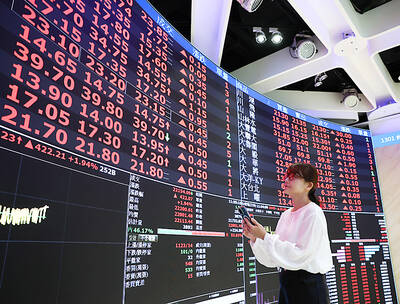Taiwan is lagging behind other countries in the development of its renewable energy sector, which will require comprehensive legislation and an injection of more money if the government wants to make sustainable production work in Taiwan, experts said.
"Exploiting green energy is a must for Taiwan, especially since it relies heavily on imported energy, which accounts for 97.9 percent of national consumption," Chan Shih-hung (詹世弘), chairman of the Taiwan Renewable Energy Industry Promotion Association (台灣新能源產業促進協會), said at the National Energy Conference on Monday.
In a report issued after the conference, the government said it plans to expand renewable energy sources to supply between 4 percent and 6 percent of the nation's power by 2020, and between 5 percent and 7 percent by 2025.
This corresponds to targets set after the previous national energy meeting in 1998.
The goal is much lower than that of countries like Germany, which plans to boost renewable energy sources to supply 12.5 percent of all its electricity by 2010, and Japan, with a goal of 10.8 percent over the same period, Chu Hsin-sen (曲新生), executive vice president of the Industrial Technology Research Institute, said at the conference.
Taiwan wants to develop the means of harnessing solar, wind, geothermal, hydroelectric and biomass energy, with hydroelectric and wind power having the most potential, Chu said.
The first step would be to pass the proposed statute on the development of renewable energy (再生能源發展條例) into law to serve as a guideline for the development of sustainable power sources, he said.
A lack of funds is another major obstacle, Chu said. He said the US, Japan and EU each devote around US$300 million a year to further the development of hydrogen power, while Taiwan has only budgeted US$7.8 million.
As a result, key technology and equipment to produce renewable energy are being controlled by foreign enterprises, he said.

UNCERTAINTIES: Exports surged 34.1% and private investment grew 7.03% to outpace expectations in the first half, although US tariffs could stall momentum The Chung-Hua Institution for Economic Research (CIER, 中華經濟研究院) yesterday raised its GDP growth forecast to 3.05 percent this year on a robust first-half performance, but warned that US tariff threats and external uncertainty could stall momentum in the second half of the year. “The first half proved exceptionally strong, allowing room for optimism,” CIER president Lien Hsien-ming (連賢明) said. “But the growth momentum may slow moving forward due to US tariffs.” The tariff threat poses definite downside risks, although the scale of the impact remains unclear given the unpredictability of US President Donald Trump’s policies, Lien said. Despite the headwinds, Taiwan is likely

READY TO BUY: Shortly after Nvidia announced the approval, Chinese firms scrambled to order the H20 GPUs, which the company must send to the US government for approval Nvidia Corp chief executive officer Jensen Huang (黃仁勳) late on Monday said the technology giant has won approval from US President Donald Trump’s administration to sell its advanced H20 graphics processing units (GPUs) used to develop artificial intelligence (AI) to China. The news came in a company blog post late on Monday and Huang also spoke about the coup on China’s state-run China Global Television Network in remarks shown on X. “The US government has assured Nvidia that licenses will be granted, and Nvidia hopes to start deliveries soon,” the post said. “Today, I’m announcing that the US government has approved for us

When Lika Megreladze was a child, life in her native western Georgian region of Guria revolved around tea. Her mother worked for decades as a scientist at the Soviet Union’s Institute of Tea and Subtropical Crops in the village of Anaseuli, Georgia, perfecting cultivation methods for a Georgian tea industry that supplied the bulk of the vast communist state’s brews. “When I was a child, this was only my mum’s workplace. Only later I realized that it was something big,” she said. Now, the institute lies abandoned. Yellowed papers are strewn around its decaying corridors, and a statue of Soviet founder Vladimir Lenin

The National Stabilization Fund (NSF, 國安基金) is to continue supporting local shares, as uncertainties in international politics and the economy could affect Taiwanese industries’ global deployment and corporate profits, as well as affect stock movement and investor confidence, the Ministry of Finance said in a statement yesterday. The NT$500 billion (US$17.1 billion) fund would remain active in the stock market as the US’ tariff measures have not yet been fully finalized, which would drive international capital flows and global supply chain restructuring, the ministry said after the a meeting of the fund’s steering committee. Along with ongoing geopolitical risks and an unfavorable